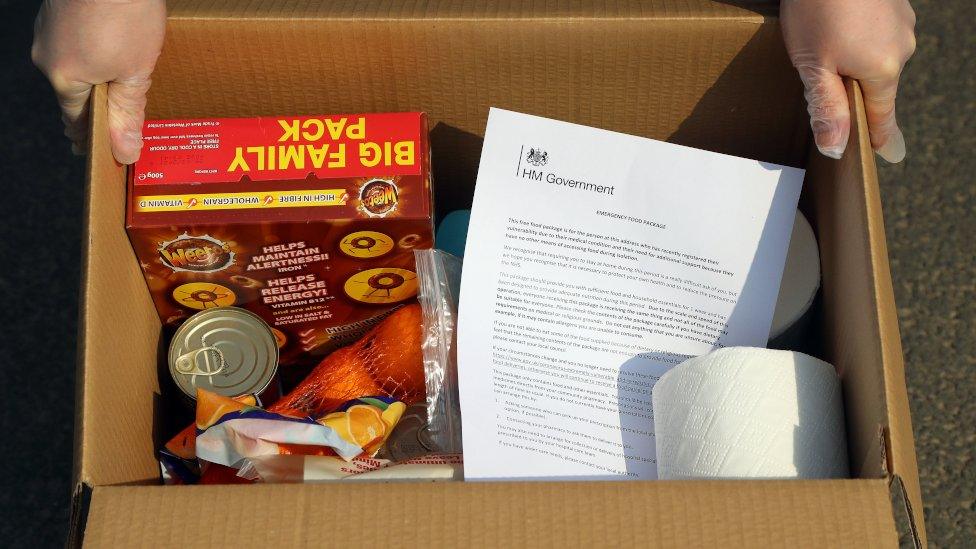Coronavirus: Supermarkets ask shoppers to be 'considerate' and stop stockpiling
- Published
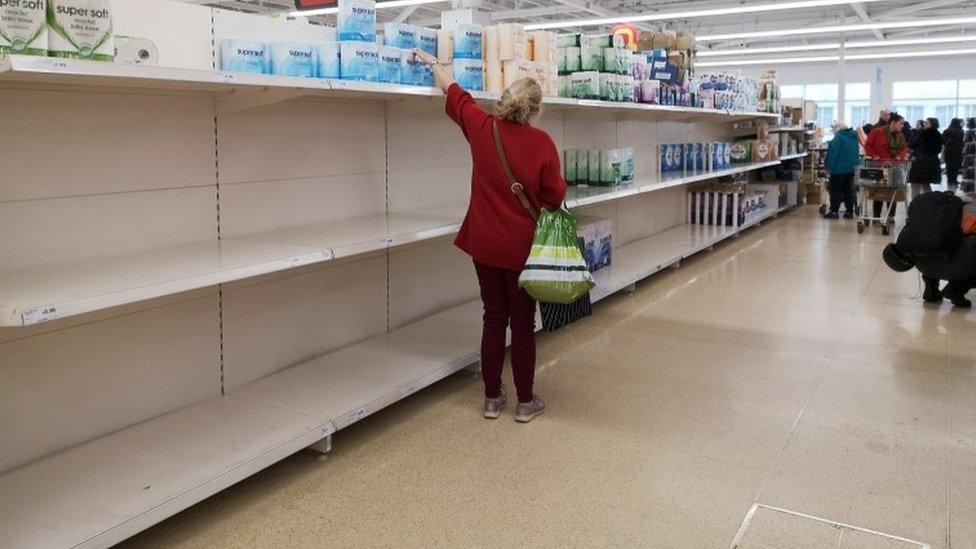
Panic buying has left some supermarkets in the UK with empty shelves
Supermarkets are urging shoppers not to buy more than they need amid concern over coronavirus-linked stockpiling.
In a joint letter, UK retailers have reminded customers to be considerate in their shopping, so that others are not left without much-needed items.
"There is enough for everyone if we all work together," it adds.
It comes after some shops began rationing the sales of certain products to avoid them selling out completely.
In the letter, the retailers say online and click-and-collect services are at "full capacity" and staff and suppliers are "working day and night to keep the nation fed".
The retailers say they are working "closely" with government and suppliers to make more deliveries to stores so that shelves are well-stocked.
"We understand your concerns but buying more than is needed can sometimes mean that others will be left without," the letter reads.
That was echoed in an email to customers from Sainsbury's boss Mike Coupe, who said: "There are gaps on shelves because of increased demand, but we have new stock arriving regularly and we're doing our best to keep shelves stocked."
In a plea to shoppers, he said: "Please think before you buy and only buy what you and your family need."

Allow X content?
This article contains content provided by X. We ask for your permission before anything is loaded, as they may be using cookies and other technologies. You may want to read X’s cookie policy, external and privacy policy, external before accepting. To view this content choose ‘accept and continue’.

Speaking on behalf of retailers, Helen Dickinson, chief executive of the British Retail Consortium (BRC), said: "In the face of unprecedented demand as a result of coronavirus, food retailers have come together to ask their customers to support each other to make sure everyone can get access to the products they need."
The plea follows widespread concern over shoppers emptying supermarket shelves as fears grow over the spread of coronavirus.
Long queues were reported outside some supermarkets on Sunday morning.
Allow X content?
This article contains content provided by X. We ask for your permission before anything is loaded, as they may be using cookies and other technologies. You may want to read X’s cookie policy, external and privacy policy, external before accepting. To view this content choose ‘accept and continue’.

Items including toilet paper, hand sanitiser, pasta and tinned foods are among those that have been in short supply.
That has led some supermarkets to limit the sale of some products, while Aldi has restricted customers to buying a maximum of four of each item.
Tesco, shoppers are limited to buying no more than five of certain goods, including anti-bacterial gels, wipes and sprays, dry pasta, UHT milk and some tinned vegetables.
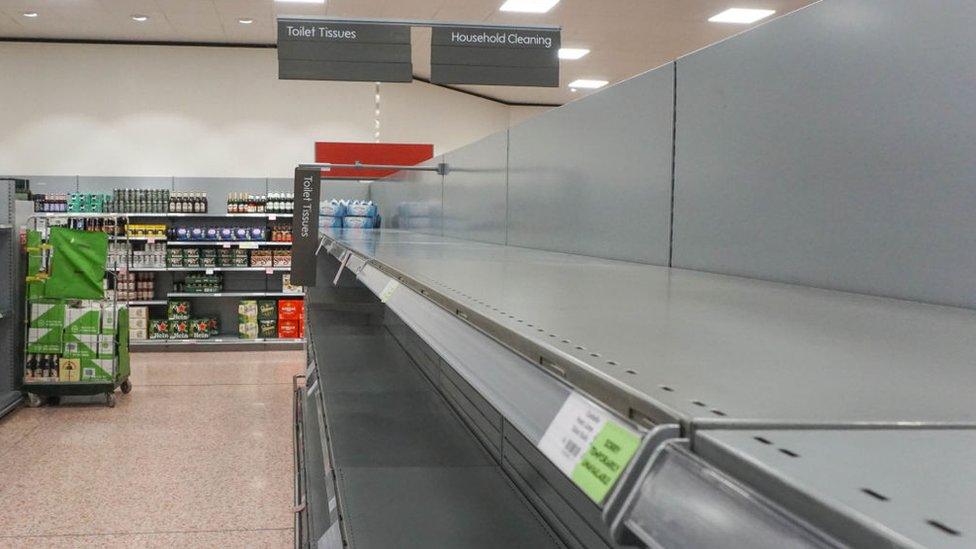
There were empty shelves at a Waitrose in Sheffield
Meanwhile, Waitrose has brought in a temporary cap on some items on its website, including some anti-bacterial soaps and wipes.
Boots and Asda are both restricting some types of hand sanitiser to two bottles per person.
Campaigners have warned stockpiling could hit the "most vulnerable" hardest.

Analysis
By Katy Austin, BBC business correspondent
Supermarkets are used to spikes in demand, for example over the festive period. But they have usually been expecting them.
It has been clear from repeatedly emptied shelves that many shoppers have not heeded the official advice that there is no need to stockpile.
The BRC lobby group insists its members are resilient and there won't be long-term shortages. And supermarkets have adapted quickly. For example, Sainsbury's has told customers today that it has increased warehouse capacity and ordered more stock. Tesco is among the brands that will take up the government's offer of extending delivery hours to keep up with demand.
But with demand unprecedented for the time of year - weeks before the expected UK peak of the pandemic - this unusual joint letter from the major supermarkets shows they feel a strong message needs sending to customers. They will be hoping that the coordinated effort will help their strained supply chains cope and ensure everyone, including the most vulnerable, can get what they need.

Some food banks say they have a shortage of basic items which have already been panic bought by shoppers.
The government has said there is no need for anyone to stockpile items, with Prime Minister Boris Johnson urging people to "behave responsibly and think about others".
The government is relaxing restrictions on delivery hours for retailers to try to ensure shops remain stocked with basic items.
Deliveries to supermarkets are usually restricted overnight to avoid disturbing local residents.
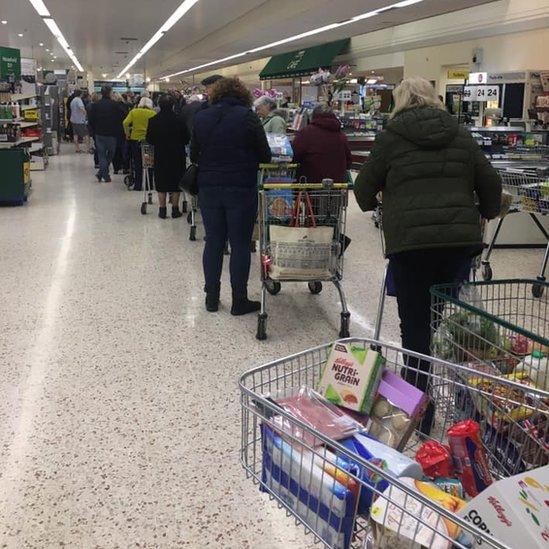
Shoppers faced a long queue at the tills in Morrisons in Kettering on Sunday

Environment Secretary George Eustice said allowing night-time deliveries would allow stock to move more quickly from warehouses to shelves.
Meanwhile, the Competition and Markets Authority watchdog has warned retailers not to "exploit" fears about coronavirus by dramatically increasing the price of protective goods such as hand gels and face masks.

Have you been stocking up because of the coronavirus? Have you been affected by panic buying? Share your experiences by emailing haveyoursay@bbc.co.uk, external.
Please include a contact number if you are willing to speak to a BBC journalist. You can also contact us in the following ways:
WhatsApp: +44 7756 165803
Tweet: @BBC_HaveYourSay, external
Send pictures/video to yourpics@bbc.co.uk, external
Please read our terms & conditions and privacy policy
- Published13 March 2020
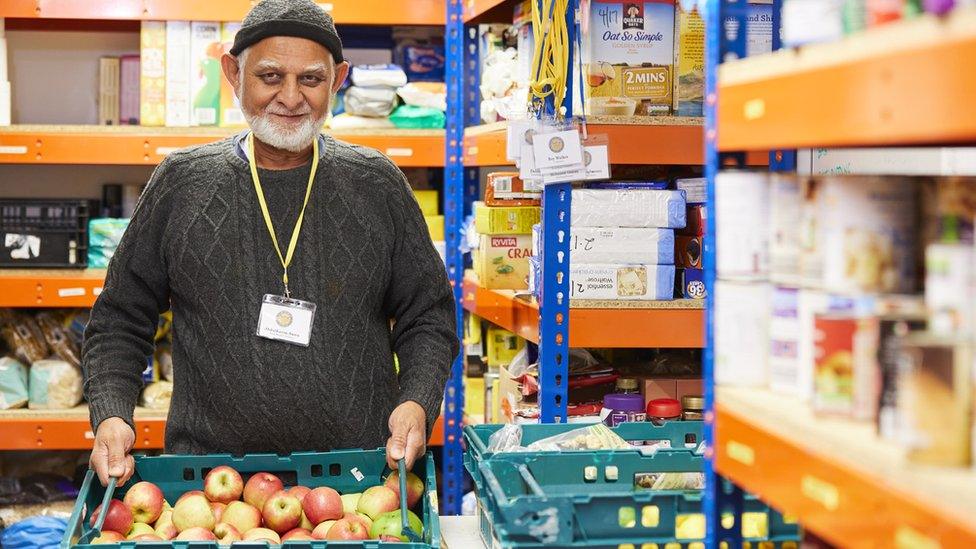
- Published9 March 2020
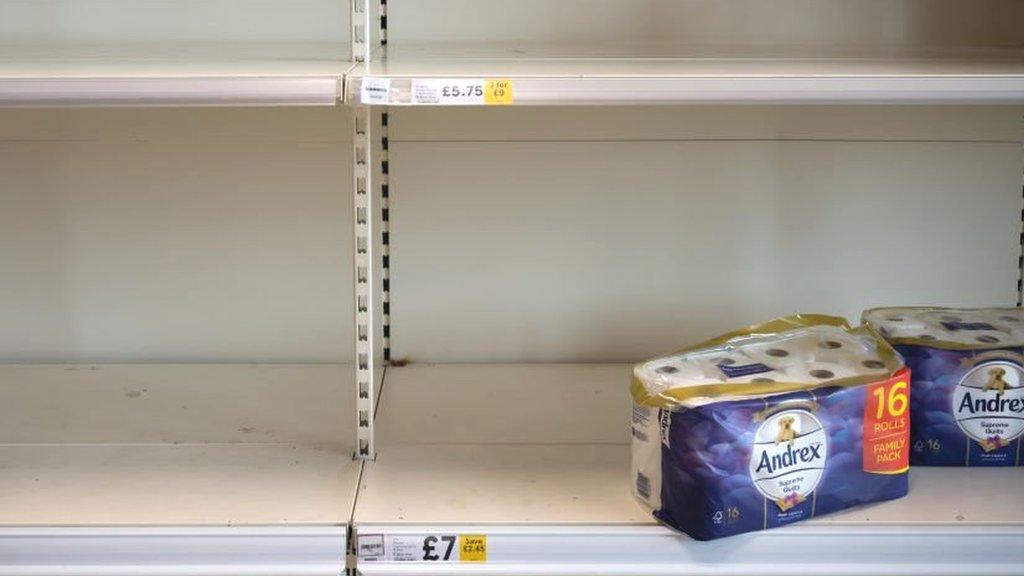
- Published3 April 2020
